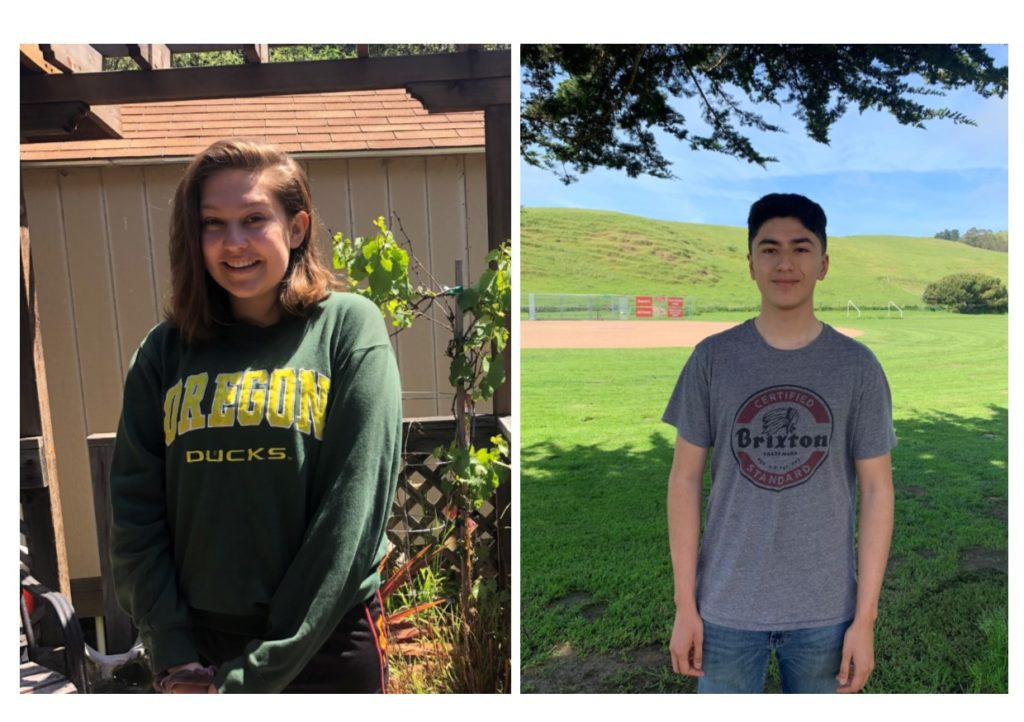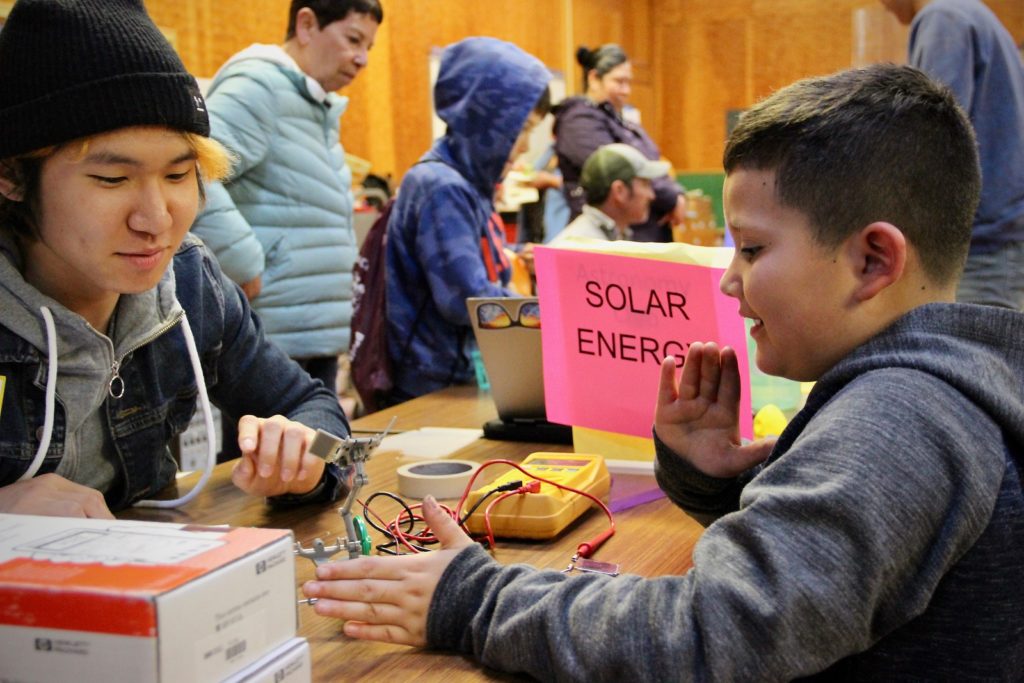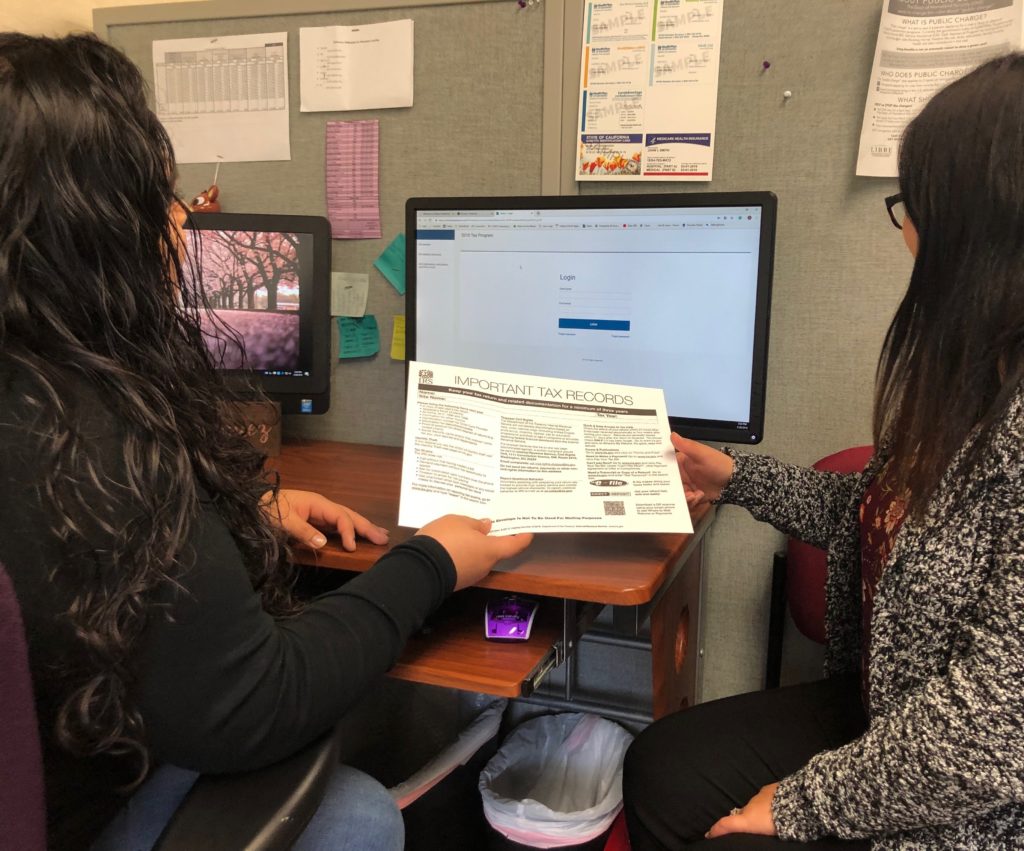
Left to Right: Emma Jacquez and Brandon Marin
Someday, Emma Jacquez and Brandon Marín’s high school years may seem like a remote island they lived on for four years until they could build a reliable boat and set sail to see the world.
On the far shore, college was always in sight. Beyond it, foggier and more distant still, a glimpse of a rewarding career. But now it’s all getting a lot closer.
Jacquez, 17, and Marín, 18, both just found out that they’ve been admitted to the college of their dreams. They’re on track to graduate from Pescadero High School. In June, they’ll receive their diplomas together with about 15 of their peers – students they’ve known all their lives, who have become like family. Their cohort has mostly gone to the same schools together, year after year.
“Honestly, I’ve been very ready to graduate for the past four years,” says Jacquez, who is headed for University of Oregon in Eugene in September. “I think graduation represents getting out of this small town.”
But for the time being, it’s their South Coast enclave that feels most real, and the outside world that’s a bit more remote.
Jacquez and Marín, who is headed to UC Berkeley in the fall, are both veterans of Puente’s summer Youth Leadership and Development Program. They both come from hard-working families.
Marín grew up in farm-owned housing, where his father works in the fields. He has several siblings, and space is tight. He describes himself using words like “competitive” and “ambitious.” He’s worked hard for top grades. He’s spent four solid summers getting work experience with Puente, all while balancing high school, side jobs, and a load of advanced classes he took at Cañada College for personal enrichment and with an eye towards possibly graduating early from UC Berkeley. Suddenly, his dreams of a career in biomedicine – or another STEM field, he hasn’t decided – are that much closer to reality.
“I’m debating between research and engineering, and being a doctor,” he says.
Jacquez grew up in an isolated enclave between La Honda and Pescadero. She’s always hungry for information, and has spent a lot of time getting to know the world by educating herself, especially on the topic of climate change. Her passions run deep: for music, for sports, for photography and for the environment. And for University of Oregon, where she thinks she will most likely study business administration with a focus on sports.
She applied to nine colleges, but her first choice was always University of Oregon because her older sister went there as well. Jacquez fell in love with the campus and the whole Oregon vibe when she visited her there. Living in Eugene will be quite different from the South Coast, where her mom works as a cashier and her dad works in maintenance at a camp in La Honda.
Puente helped both students get into their dream schools, and helped with financial considerations as well.
“Puente really helped me pay to take my SATs, and helped with sending my score to my schools, sending my applications, and all these other little things I didn’t know I had to pay for,” she says. “In total, it easily added up to $1,000.”
Jacquez has struggled in math and chemistry. Puente found her a tutor to help her raise her grades before applying to colleges. In her summer with the youth program, Puente helped her tighten her résumé.
“And they went over my college applications with me like five times. They looked at all my extracurriculars and they made sure I included all of those. It was super helpful,” she adds.
“Colorful and vibrant” are the words Puente Education Director Lizeth Hernandez uses to describe Jacquez, who sings and plays ukulele, and can play drums and guitar. “She finds humor and joy in all the activities she engages in, and more importantly, has a genuine interest in all that she does.”
Puente has had a role in Marín’s life since he was 14, when he first joined Puente’s summer Youth Leadership and Development Program. One summer, he worked in the Puente office; another summer, he was an intern working at the Computer History Museum in Mountain View. Last year, he shadowed Puente’s team of Community Health Workers, or Promotoras.
Puente’s youth program staff helped Marín believe he could take on the world. “Over the years, they’ve provided a lot of help with examples of careers to look into,” he says.
Puente found Marín tutors to help him with math homework. “I had a lot of trouble with math early on. I spent a lot of time on that, and sciences as well,” says Marín.
Despite those challenges, he’s made the sciences his forte. And he loves math. He’s even taking advanced calculus classes at Cañada College in his spare time. “I worked for these to become my strongest suits,” he says.
In his senior year, Hernandez and Puente Education Associate Monica Resendiz helped Marín with his college application essays. They helped him apply for scholarships to pay for school. And they also set him up with a donor who could help fund some of his college expenses. “That was a really big one,” says Marín.
His years of effort made the moment he got into UC Berkeley even sweeter. He was checking his email over and over, refreshing his inbox to see whether he’d been accepted. Then he thought he should also check his spam inbox… and there it was, the letter that started out with the word “Congratulations.”
“I yelled really loud when I found out. I called for my parents… They’re really, really happy. My brother and sisters started to send me messages, to congratulate me. It was a really fun day.”
Hernandez was thrilled to hear that Marín was admitted to UC Berkeley, but not at all surprised. “He’s a determined and persistent young man,” she says. “In the time leading up to college application deadlines, Brandon could always be found at Puente, working on perfecting his essays.”
Jacquez and Marín both have parents who strongly support their college and career ambitions, and that has made a huge difference. Jacquez can’t wait for her parents to be the ones to visit her on campus in Eugene, where she’ll test out her independence for the first time.
Marín has been looking forward to showing his parents the UC Berkeley campus as well. He’s seen it, but they haven’t. He has his ideal dorm picked out already, and he’s located the buildings where he’ll probably be taking most of his classes.
“It’s really nice – I want to show them where I’m going to be living the next four years,” he says.
It is with the support of donors like you that we can provide support to Emma, Brandon and more students. From academic support, university scholarships, leadership development and paid professional practices for young people in the South Coast. All donations made from now until May 2 will double! If you want to support more young people in the community consider making a donation today.
Dos jóvenes del programa de Puente son aceptados en las universidades de sus sueños.
Algún día, los años en la preparatoria de Emma Jacquez y Brandon Marín parecerán una isla remota en la que vivieron durante cuatro años hasta que pudieron construirse un barco de confianza para lanzarse y ver mundo.
En su horizonte, la universidad siempre estaba a la vista. Más allá de él, y más distante aún, se veía una carrera gratificante. Pero ahora todo se está acercando a su orilla con más rapidez.
Tanto Jacquez, de 17 años, como Marín, de 18, fueron notificados recientemente que habían sido admitidos a la universidad de sus sueños. Ahora están en camino de graduarse de la preparatoria de Pescadero. En junio, recibirán sus diplomas junto con aproximadamente 15 de sus compañeros, estudiantes que han conocido toda su vida, y que se han convertido en su familia. La mayoría de sus compañeros han ido a las mismas escuelas juntos, año tras año.
“Honestamente, he estado lista para graduarme los últimos cuatro años,” dice Jacquez, quien se dirige a la Universidad de Oregón en Eugene en septiembre. “Creo que lo que la graduación representa realmente es salir de esta pequeña pueblo.”
Pero por el momento, es su vida en la costa sur lo que se siente más real, y el mundo exterior es un poco más remoto.
Jacquez y Marín, el cual irá a UC Berkeley en el otoño, son veteranos del Programa de Desarrollo, Empleo y Liderazgo Juvenil de Puente. Ambos provienen de familias muy trabajadoras.
Marín creció en una finca que provee vivienda y donde su padre trabaja. Él tiene varios hermanos, y el espacio donde viven, es estrecho. Se describe a sí mismo usando palabras como “competitivo” y “ambicioso”. Ha trabajado muy duro para obtener buenas calificaciones. Pasó cuatro veranos ganando experiencia de trabajo con Puente, todo mientras equilibraba la preparatoria, trabajos paralelos y un montón de clases avanzadas que tomó en Cañada College para enriquecimiento personal y con miras a posiblemente graduarse temprano de UC Berkeley. De repente, sus sueños de una carrera en biomedicina, u otro campo de ciencias, ingeniería o technología, aún no lo ha decidido, están mucho más cerca de la realidad.
“Estoy debatiendo entre la investigación y la ingeniería, o ser un médico,” dice.
Jacquez creció en un lugar aislado entre La Honda y Pescadero. Siempre está deseosa de información y ha pasado mucho tiempo conociendo mundo y educándose a sí misma, especialmente sobre el tema del cambio climático. Sus pasiones son profundas: por la música, los deportes, la fotografía y el medio ambiente. Y también tiene pasión por la Universidad de Oregón, donde cree que probablemente estudiará administración de empresas con enfoque en los deportes.
Mandó solicitudes a nueve universidades, pero su primera opción siempre fue la Universidad de Oregón porque su hermana mayor también fue allí. Jacquez se enamoró del campus y de toda el ambiente de Oregón cuando la visitó allí. Vivir en Eugene será bastante diferente de la Costa Sur, donde su madre trabaja como cajera y su padre trabaja en el mantenimiento de un campamento.
Puente asistió a ambos estudiantes a aplicar para las escuelas de sus sueños y también les ayudó con consideraciones financieras.
“Puente me ayudó a pagar mis exámenes SAT y me ayudó a enviar mi puntuación a mis escuelas, enviar mis solicitudes y todas esas otras cosas pequeñas que no sabía que tenía que pagar,” dice ella. “En total, se agregaron fácilmente hasta $1,000.”
Jacquez ha luchado siempre con las matemáticas y la química. Puente le encontró un tutor para ayudarle a mejorar sus calificaciones antes de mandar solicitudes para las universidades. En su verano con el programa juvenil, Puente la ayudó a ajustar su currículum.
“Y repasaron mis solicitudes universitarias conmigo como cinco veces. Miraron todos mis programas extracurriculares y se aseguraron de que los incluyera todos. Fue muy útil,” añade.
“Colorida y vibrante” son las palabras que utiliza la Directora de Educación de Puente, Lizeth Hernández, para describir a Jacquez, quien canta y toca el ukelele, y también puede tocar la batería y la guitarra. “Encuentra el humor y la alegría en todas las actividades en las que participa, y lo que es más importante, tiene un interés genuino en todo lo que hace.”
Puente ha tenido un papel en la vida de Marín desde que tenía 14 años, cuando se unió por primera vez al Programa de Empleo, Desarrollo y Liderazgo Juvenil. Un verano, trabajó en la oficina de Puente; otro verano, aceptó trabajar en el Museo de Historia de la Computación en Mountain View. El año pasado, acompañó al equipo de Trabajadoras de la Salud Comunitaria o Promotoras de Puente cuando salían a hacer sus visitas a los ranchos.
El personal del programa juvenil de Puente ayudó a Marín a tener confianza en que sí es posible conquistar el mundo. “A lo largo de los años, me han brindado mucha ayuda con ejemplos de carreras a tener en cuenta,” dice.
Puente encontró a tutores para Marín para que lo ayudaran con las tareas de matemáticas. “Tuve muchos problemas con las matemáticas desde el principio. Pasé mucho tiempo en eso, y también en ciencias,” dice Marín.
A pesar de estos desafíos, ha hecho de las ciencias su fuerte. Y le encantan las matemáticas. Incluso está tomando clases de cálculo avanzado en Cañada College en su tiempo libre. “Trabajé para que éstas se convirtieran en mis asignaturas más fuertes,” dice.
En su último año, Hernández y la Asociada de Educación de Puente, Monica Resendiz, ayudaron a Marín con sus ensayos de solicitud de ingreso a la universidad. Lo ayudaron a solicitar becas para pagar la escuela. Y también lo pusieron en contacto con un donante que podría ayudar a financiar algunos de sus gastos universitarios. “Eso fue realmente lo mejor,” dice Marín.
Sus años de esfuerzo hicieron que el momento en que ingresó a la Universidad de Berkeley fuera aún más dulce. Estaba revisando su cuenta de correo electrónicos una y otra vez, refrescando su bandeja para ver si había sido aceptado. Luego pensó que también debería revisar su bandeja de correo donde va el spam… y ahí estaba, la carta que comenzaba con la palabra “Felicitaciones.”
“Lancé un grito cuando me enteré. Llamé a mis padres … se sintieron realmente felices. Mi hermano y hermanas comenzaron a enviarme mensajes para felicitarme. Fue un día realmente excepcional.”
Hernández se emocionó al saber que Marín fue admitido en UC Berkeley, pero no estaba en absoluto sorprendida. “Es un joven decidido y persistente,” dice ella. “En el tiempo previo a los plazos de solicitud de ingreso a la universidad, Brandon siempre se podía encontrar en Puente, trabajando para perfeccionar sus ensayos.”
Jacquez y Marín tienen padres que apoyan firmemente sus ambiciones universitarias y profesionales, y eso ha hecho una gran diferencia. Jacquez está contenta y espera que sus padres sean los que la visiten en el campus de Eugene, donde probará su independencia por primera vez.
Marín también ha estado esperando mostrar a sus padres el campus de UC Berkeley. El lo ha visto, pero sus padres todavía no. Ya ha elegido su dormitorio ideal que está ubicado en los edificios donde probablemente tomará la mayoría de sus clases.
“Es muy bonito, quiero mostrarles dónde viviré los próximos cuatro años,” dice.
Es con el apoyo de donantes como usted que podemos proporcionar apoyo a Emma, Brandon y más estudiantes como ellos. Desde apoyo académico, becas universitarias, desarrollo de liderazgo y prácticas profesionales pagadas para jóvenes en la Costa Sur. ¡Todas las donaciones hechas desde ahora hasta el 2 de mayo se duplicarán! Si desea apoyar a más jóvenes de la comunidad considere hacer una donación hoy.






